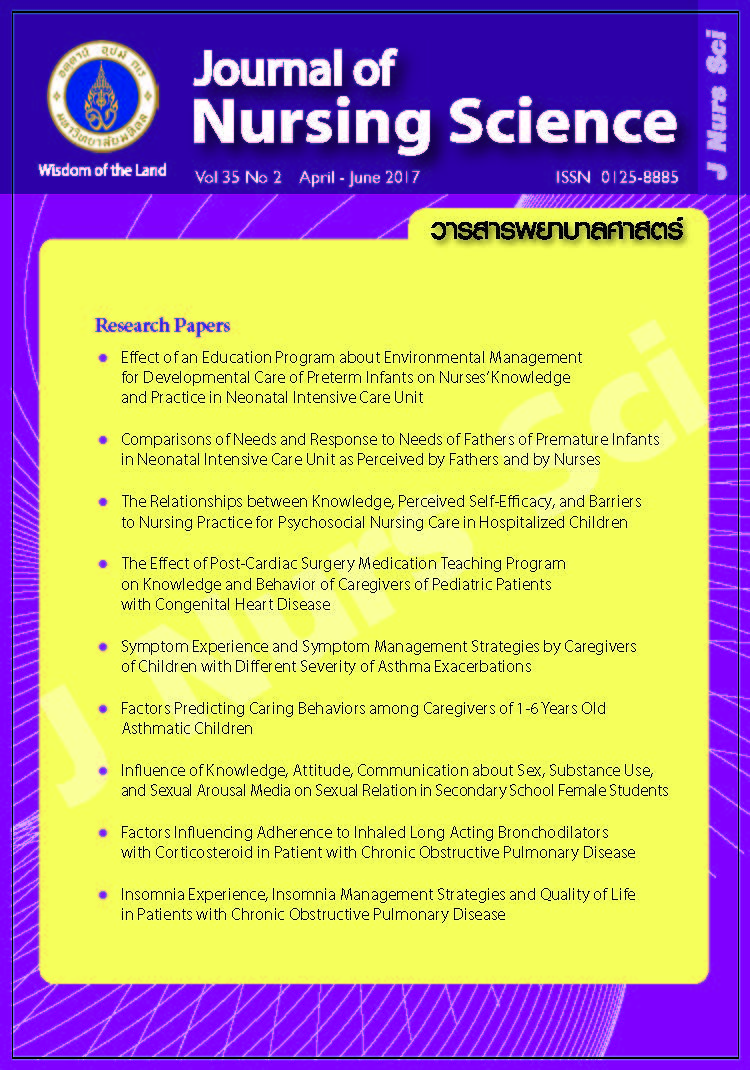The Effect of Post-Cardiac Surgery Medication Teaching Program on Knowledge and Behavior of Caregivers of Pediatric Patients with Congenital Heart Disease
Main Article Content
Abstract
Abstract
Purpose: To examine the effect of post-cardiac surgery medication teaching program on knowledge and behavior of caregivers of pediatric patients with congenital heart disease.
Design: Quasi-experimental design.
Methods: The sample composed of caregivers of one month to five years postoperative pediatric patients with congenital heart disease who were treated at tertiary hospital in Bangkok, Thailand. The sample was divided into two groups, 29 subjects in the experimental and 25 subjects in the control group.
Caregivers in the experimental group received the medication teaching program while caregivers in the control group received routine care. Data were collected using the medication knowledge and behavior questionnaires for caregivers of postoperative children with congenital heart disease. Data were analyzed
by descriptive statistics and analysis of covariance (ANCOVA).
Main findings: The results revealed that caregivers in the experimental group had statistically significant higher medication knowledge and behavior scores than caregivers in the control group [F (2, 51) = 69.12, p < .05; F (2, 49) = 35.89, p < .05].
Conclusion and recommendations: This study shows that the medication teaching program is effective in improving caregivers’ medication knowledge and behavior. These would assist the caregivers to provide medications to postoperative children with congenital heart disease with accuracy, completeness and safety when children return home.
ผลของโปรแกรมการสอนเรื่องการให้ยาชนิดรับประทานหลังผ่าตัดหัวใจ ต่อความรู้และพฤติกรรมของผู้ดูแลเด็กโรคหัวใจพิการแต่กำเนิด
บทคัดย่อ
วัตถุประสงค์: เพื่อศึกษาผลของโปรแกรมการสอนเรื่องการให้ยาชนิดรับประทานหลังผ่าตัดหัวใจในผู้ดูแลเด็กโรคหัวใจพิการแต่กำเนิด
รูปแบบการวิจัย: การวิจัยกึ่งทดลอง
วิธีดำเนินการวิจัย: กลุ่มตัวอย่างเป็นผู้ดูแลเด็กโรคหัวใจพิการแต่กำเนิดหลังผ่าตัดหัวใจ อายุตั้งแต่ 1 เดือน ถึง 5 ปี และเข้ารับการรักษาที่โรงพยาบาลตติยภูมิแห่งหนึ่งในกรุงเทพมหานคร แบ่งเป็นกลุ่มควบคุม จำนวน 29 คน และกลุ่มทดลอง จำนวน 25 คน กลุ่มทดลองได้รับโปรแกรมการสอนเรื่องการให้ยาชนิดรับประทาน ส่วนกลุ่มควบคุมได้รับการพยาบาลตามปกติ เก็บรวบรวมข้อมูลโดยใช้แบบสอบถามความรู้ และแบบสอบถามพฤติกรรมของผู้ดูแลในการให้ยาชนิดรับประทานแก่เด็กโรคหัวใจพิการแต่กำเนิดหลังผ่าตัด วิเคราะห์ข้อมูลทั่วไปโดยใช้สถิติพรรณนาและวิเคราะห์ความแปรปรวนร่วม (ANCOVA)
ผลการวิจัย: ภายหลังการเข้าร่วมโปรแกรม กลุ่มทดลองมีคะแนนความรู้และคะแนนพฤติกรรมในการให้ยาชนิดรับประทานแก่เด็กโรคหัวใจพิการแต่กำเนิดหลังผ่าตัดหัวใจสูงกว่าผู้ดูแลกลุ่มควบคุม อย่างมีนัยสำคัญทางสถิติ [F (2, 51) = 69.12, p < .05; F (2, 49) = 35.89, p < .05].
สรุปและข้อเสนอแนะ: โปรแกรมการสอนครั้งนี้มีประสิทธิภาพในการส่งเสริมให้ผู้ดูแลเด็กโรคหัวใจพิการแต่กำเนิดหลังการผ่าตัดหัวใจมีความรู้และพฤติกรรมในการให้ยาชนิดรับประทานที่ดีขึ้นเพื่อให้เด็กได้รับยาอย่างถูกต้อง ครบถ้วน และปลอดภัยจากการได้รับยาชนิดรับประทานเมื่อกลับไปอยู่ที่บ้าน
คำสำคัญ : ความรู้ พฤติกรรม โปรแกรมการสอนเรื่องการให้ยาชนิดรับประทานหลังผ่าตัดหัวใจ ผู้ดูแล เด็กโรคหัวใจพิการแต่กำเนิด
Article Details
Copyright Notice: Nursing Science Journal of Thailand has exclusive rights to publish and distribute the manuscript and all contents therein. Without the journal’s permission, the dissemination of the manuscript in another journal or online, and the reproduction of the manuscript for non-educational purpose are prohibited.

Disclaimer: The opinion expressed and figures provided in this journal, NSJT, are the sole responsibility of the authors. The editorial board bears no responsibility in this regard.


